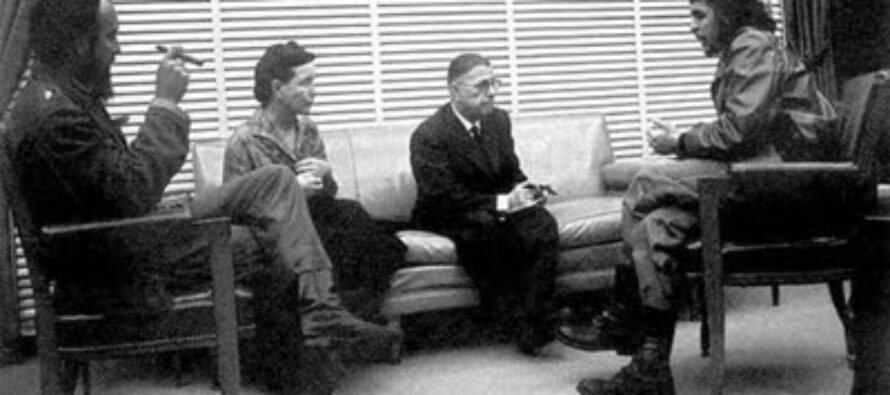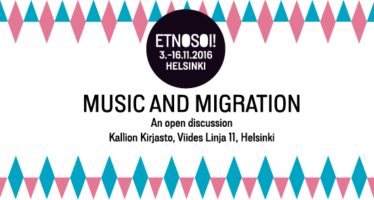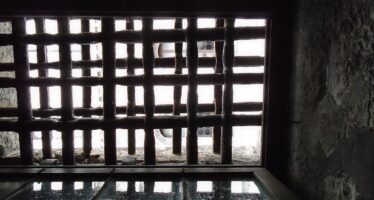Will CUBA become a test case for a post-postmodern future?

![]()
Last month I was invited to speak with students and faculty at a theological colloquium in the Cuban coastal city of Matanzas. This is a new moment for Cuba, and I imagine that the next time I travel there I won’t find the same country I visited this time around.
In April, Cuba’s National Assembly will elect a new president, who, likely for the first time since the 1959 Revolution, will not be a Castro (though Raul Castro will retain party and military leadership for now). As the revolutionary generation passes away, other post-Castro changes are in the air too, including the eventual relaxation (post-Trump) of US sanctions on direct investment and travel, and with it the gradual incorporation of the world’s last functioning socialist nation into the global financial system.
Little may change in the short-run, but ultimately Cuba will face serious questions about how to protect the gains of its revolution. Will the country follow China’s mixed socialist-capitalist one-party path toward economic integration? Will it evolve into a multi-party liberal democracy? How will Cuba defend an educated, egalitarian society—one that proudly ‘puts people at the center’—from rising inequality? The colloquium left me wondering how the next generation of civil society leaders will navigate Cuba’s opening to the wider neoliberal world.
Of course, this challenge isn’t unique to Cuba. Progressive leaders everywhere are struggling to create a coherent vision for a world of freedom, equality and human flourishing. Specifically, they are frustrated with postmodernism’s inability to articulate a positive political challenge to the false promises of neoliberal development, and are looking beyond it for post-postmodern alternatives that aren’t locked into conventional left/right, socialist/capitalist dichotomies.
What might such a post-postmodern consciousness look like? Two young Dutch cultural scholars, Timotheus Vermeulen and Robbin van den Akker, believe they have found it in a growing trend that they call ‘metamodernism’—a concept that has struck a chord with a wide audience since their landmark paper “Notes on Metamodernism” was published in 2010. But what does it mean?
Vermeulen and van den Akker argue that the way the world feels to us—our sensibility about the world order—changed profoundly in the first decade of the new millennium. They describe this feeling as a shift in ‘affect’ (our emotional reactions), and a change in the cultural logic we use to sort the world out. Think of this as a shift in our collective ‘structure of feeling,’ or as Charles Taylor calls it, our ‘social imaginary.’
This mood shift is partly circumstantial: 9/11, the Great Recession, the Iraq war, accelerating climate change, mass-migration, structural racism, inequality, and worker precarity have greatly undermined our confidence in social, economic and political institutions. For a generation raised on the glitter of globalization in the booming 1990s, the inept, even corrupt, performance of virtually every public and private institution since then has crushed their hopes. They sense that all that is solid melted into the air a long time ago; that uncertainty, complexity and chaos are the new normal; and that our cultural and social reflexes tell us that something ominous is happening to the world.
Vermeulen and van den Akker discern this shifting affect in the aesthetics of a rising generation of artists who are looking for a way beyond postmodernism. They find it, first, in the ‘new sincerity’ of writers like David Foster Wallace, Zadie Smith and Dave Eggers; the band Arcade Fire; Wes Anderson’s ‘quirky’ film style; and even the American hit TV series “Parks and Recreation.” These artists directly confront postmodern irony, cynicism and social disengagement with a fresh commitment to authentic feeling and relationships.
They also find it in a return to romanticism that is rooted in human reconciliation with the earth and with a return to more hopeful, utopian visions—for example, in the architecture of Swiss design firm Herzog and de Meuron and a return to figurative and narrative painting. Vermeulen and van den Akker’s analysis is echoed in the US by Seth Abramson who blogs about the metamodern condition at the Huffington Post.
Along with a near universal disillusionment with the current order, these artists, writers and activists perceive a deepening realism and seriousness about the condition of society among long-comfortable westerners who once took their ease for granted, but who now realize that even they can be crushed by unaccountable global power structures (as self-centered as this may seem to the rest of the world). Their great fear is nihilism; their greatest desire is to find a source of hope and a new political narrative to guide them into a better future.
Such efforts express a popular longing to escape postmodernism’s cultural logic and its council of despair that surrendered the world to neoliberalism—its ‘end-of-everything’ cynicism, sarcasm and irony; its bottomless critique, crippling political passivity and infatuation with cultural ‘power’.
Instead, they see the re-appearance of values that the postmoderns disrespected as merely ‘modern’—things like sincerity in place of irony, commitment instead of detachment, and a depth (versus surface) sense of reality; a return of historical consciousness (the belief that the future can be better than the past); a willingness to create big-picture theories of the world or new ‘metanarratives;’ and a renewed belief in ‘progress’ and transcendent visions—something, that is, to believe in and fight for.
Underlying this new structure of feeling is a deeper philosophical turn and a richer historical sensibility. Metamodernism abandons notions of history as an orderly, evolutionary sequence of cultural ‘beads-on-a-string’ that cancel each other out as each period passes by. Instead, it argues that past forms of consciousness are really not past at all.
In the west, for example, elements of the medieval, theological consciousness still sit alongside those from modern (theoretical) and postmodern (critical) consciousness, remaining simultaneously present and mutually influential. When combined rather than pitted against each other, the most productive elements of each form of consciousness can be re-assembled to create a rich array of resources to direct our emerging social, political and economic development.
In metamodernism, the prefix ‘meta’ is not used to mean ‘after’ or ‘above’, though it does carry a soft meaning as somehow ‘transcendent’ or ‘beyond.’ But drawing from the Greek philosophical term metaxy, ‘meta’s’ hard meaning is to be ‘in-between’, a mediation between two poles. To be metamodern is to practice a form of mindfulness that refuses the zero-sum game that pits one form of consciousness against another.
Instead, one moves back and forth between different poles in order to look for integration rather than contradiction. To think metaxologically means to stand among the ‘isms’—socialism, capitalism, collectivism, individualism, theism and atheism—and allow them to interact and interpret each other, rather than standing with one ‘ism’ against the others.
In this way, metamodern mindfulness interrogates, and seeks to resolve, opposites that subdivide our individual consciousness and alienate us from each other: identity/universality, local/global, nihilism/meaning, cynicism/trust, detachment/commitment, materialism/spirituality, nature/culture, hierarchy/anarchy, markets/politics, and so on down the list. The point is not that we can resolve these opposites into neat new packages, but that by constantly interrogating one in terms of the others we can generate new meanings and richer possibilities.
How is all this relevant to Cuba? At the colloquium I attended, a University of Havana psychologist put Cuba’s social ferment like this: “Given our high levels of education, Cubans have a first-world sensibility but live in third-world poverty.” The young are left frustrated. Instead of the revolution they dream of Miami, and unless something changes many of them will move there.
If, or when, Cuba cautiously opens to outside investment and global integration, will its civil and political leaders take advantage of this new metamodern mood to reframe their country’s expectations and paths to the future? There will be many ‘opposites’ to resolve that other countries are struggling with—property rights versus personal rights for dignity, subsistence and security, for example, or reconciling socialist collectivism and capitalist individualism, two very different structures of feeling.
Metamodern mindfulness offers a new way of thinking about the ideological conflicts of the past—a new frame through which to assess class conflict, egalitarianism, liberal freedoms and religious values—and the possibility of new syntheses within and between these things. For Cuba to perfect its revolution rather than abandon it or see it consumed from the outside, a re-definition of the kind of utopia it desires is necessary, along with a new mood of sincerity and commitment to build and sustain it.
Cuba once captured the left’s imagination. It can do so again for a new generation of leaders if it succeeds in lifting its people out of poverty while preserving the human gains of its revolution, but this time it will be different. Latin America, locked in its seemingly eternal cycles of left/right conflict, can certainly use new models that work in practice. And maybe Cuba’s giant neighbor to the north will learn something too.
Gregory Leffel* , 25 March 2018
Gregory Leffel Ph.D., is a missiologist working on collective action, social movements and theo-politics, and is director of One Horizon Institute in Lexington, Kentucky. He is author of Faith Seeking Action: Mission, Social Movements, and the Church in Motion; and is past president of the American Society of Missiology.
Source:
This article was originally published in the independent online magazine www.opendemocracy.net
This article is published under a Creative Commons Attribution-NonCommercial 4.0 International licence. If you have any queries about republishing please contact info@opendemocracy.net.
Image:
By Alberto Korda
Ernesto Che Guevara reunido con Simone de Beauvoir y Jean Paul Sartre, en Cuba. 1960. Antonio Núñez Jiménez is at left.
http://2.bp.blogspot.com/_Bthih_Lv8pU/SvyrTykcp4I/AAAAAAAABOE/2DH03ZG05SM/s400/, Public Domain,
https://commons.wikimedia.org/w/index.php?curid=9070671
Related Articles
İlhan Sami Çomak. The Poet Turkey Fears
![]()
SPEAK UP, the Turkish human rights platform based in Istanbul, Diyarbakır and Eskişehir, have recently released their interview with İlhan Sami Çomak, the Kurdish poet, unjustly imprisoned since 1994
Musician’s identity to be respected as a human right says Finnish Society for Ethnomusicology
![]()
PUBLIC STATEMENT 11 January 2017 In October 2016, The Finnish Migration Office (Migri) denied asylum from an Iraqi viola player. In
Resistance. For Ilhan Comak and all political prisoners in Turkey
![]()
İlhan Sami Çomak, who was born in 1973, was arrested as a young student in 1994. There is currently a campaign and increased publicity to try and get this poet released




